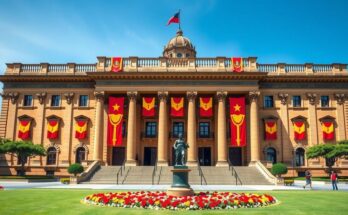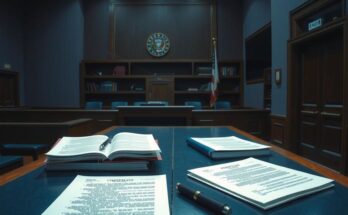Tunisia heads to the polls for a presidential election likely to secure a second term for President Kais Saied, who has faced criticism and opposition suppression. This election marks a significant moment in the nation’s democratic journey, highlighting serious concerns about electoral integrity and political freedoms as economic challenges persist.
On Sunday, Tunisians participated in an election anticipated to secure a second term for President Kais Saied, amidst significant contention surrounding the electoral process. With key opposition figures imprisoned, Saied, aged 66, appears poised to confront few barriers on his path to reelection. His initial ascent to power, five years prior, was fueled by widespread anti-establishment sentiments, and since then, he has enacted substantial changes, including suspending parliament and rewriting the constitution to amplify presidential powers. This election marks the third occasion Tunisia has voted following the 2011 uprising that culminated in the removal of autocrat Zine El Abidine Ben Ali, which was a pivotal moment in the Arab Spring. Although international observers previously commended earlier elections for adhering to democratic standards, this year’s election raises serious questions of fairness due to numerous arrests and controversial actions taken by an election authority established by Saied. Some opposition factions have called for a boycott of the electoral process. Previously viewed as the singular success of the Arab Spring, Tunisia has deteriorated into a situation characterized by political discord and economic strife. Despite being hailed for establishing a new democratic constitution and for its civil society groups receiving the Nobel Peace Prize, the nation’s leaders have been unable to improve economic conditions, which remain dire, accompanied by political unrest. Kais Saied garnered support as a political outsider in the 2019 election, pledging to reinvigorate Tunisia and empower youth and local governments. However, as he approaches his reelection, the populace’s sentiments regarding the trajectory of Tunisian democracy, which has slipped since his inauguration, remains uncertain. Notably, many prominent potential candidates either faced imprisonment or were barred from participation in this election. Of the seventeen who sought approval, only three names appeared on the ballot, including Saied himself. The deteriorating economic climate, with an unemployment rate soaring to 16%, has compounded public disillusionment. Saied’s administration has struggled to negotiate a bailout package from the International Monetary Fund due to disagreements over economic reforms. Moreover, harsh policies against sub-Saharan African migrants and rising emigration attempts reflect a growing crisis. While maintaining ties with Western allies, Tunisia’s political landscape has undergone significant transformations. Saied’s administration has pivoted towards partnerships with countries like Iran and China, asserting a stance of sovereignty. Nevertheless, Tunisia’s approach to issues such as migration management remains entwined with its relationships with Europe. Saied has positioned himself as a protector of Tunisian sovereignty, even as he navigates complex international relations under increasing domestic challenges. As the election unfolds, observers await the results, not only regarding the political future of Tunisia but also the implications for the broader region that watches closely.
Tunisia’s democratic path has been tumultuous since the Arab Spring, which inspired uprisings throughout the region. The nation was initially noted for its successful transition to democracy after the ousting of Zine El Abidine Ben Ali. Yet, recent developments indicate a regression toward authoritarianism under President Kais Saied, who has consolidated his power since his election in 2019. This backdrop of rising political tensions and economic challenges, particularly highlighted by increasing unemployment and unresolved issues related to migration, creates an environment of uncertainty surrounding the current election process.
In conclusion, the upcoming election in Tunisia is a critical moment that encapsulates the struggle for democracy in the region. With President Kais Saied likely to continue on his path to reelection despite serious concerns regarding the fairness of the electoral process, it remains to be seen how this will affect the political landscape amid economic difficulties and social unrest. The international community watches closely, considering Tunisia’s significance as a barometer for democratic progress in the Arab world.
Original Source: www.cnn.com




